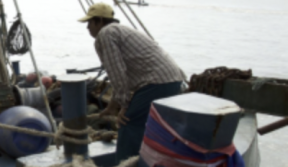
Publication Date:
Migrant fishers in Taiwan’s distant water fishing industry, their unions, and international allies have launched a global campaign called “Wi-Fi NOW for Fishers’ Rights at Sea,” demanding access to Wi-Fi for fishers on board Taiwanese distant water fishing vessels. Wi-Fi access is necessary for fishers to be able to exercise their rights to freedom of association and collective bargaining so that they can defend their other fundamental labor rights under international law, including their right against forced labor. Taiwan, the United States, and other key markets — as well as global corporate actors such as vessel owners, global seafood buyers, and investors — all have a critical role to play in making this happen.
The Wi-Fi NOW for Fishers’ Rights at Sea campaign presents this third briefing paper, “Wi-Fi for Fishers’ Fundamental Labor Rights” to explain how and why the lack of access to Wi-Fi for fishers on board distant water fishing vessels itself violates fishers’ right to freedom of association by creating a “no union zone” at sea, which also leads to violations of fishers’ fundamental rights to work in a healthy and safe workplace without forced labor and without discrimination based on national origin or migrant status.
This briefing provides background on fishers in Taiwan’s distant water fishing industry and their working conditions, followed by an explanation of how the absence of Wi-Fi in Taiwan’s distant water fishing fleet creates a “no union zone” that violates the freedom of association and of how Wi-Fi consistent with freedom of association on distant water fishing vessels is essential for realizing all labor rights in the industry.
Below are some key points highlighted in this briefing paper:
- Union access to the workplace is a core feature of ILO freedom of association. This right applies to workplaces that are more difficult to access, including fishing vessels.
- Fishers’ access to unions at sea requires access to Wi-Fi because satellite phones are inadequate to enable fishers to fully exercise their right to freedom of association at sea.
- The requirement for fishers’ “reasonable access to communication facilities” on board vessels under Article 71 of the ILO Work in Fishing Convention, 2007 (No. 188) (“C188”) must be read in the context of the freedom of association’s requirement for union access to fishing vessels, according to the rules of statutory construction.
- Access to Wi-Fi empowers fishers to enforce their right to a safe and healthy workplace, which includes the right to remove themselves from dangerous work situations, by allowing them to report abusive behaviors or dangerous work conditions in real time.
- Access to Wi-Fi helps prevent and address forced labor by rebalancing power between workers and employers to transform working conditions so that they are not exploitative in the first place and by allowing fishers to report any existing indicators of forced labor.
- Access to Wi-Fi helps rectify violations of migrant fishers’ right to freedom of association in a sector that is predominantly staffed by migrant labor.
Publication Type:
- Report


